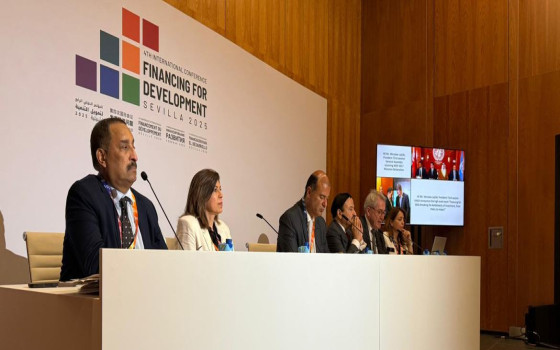
"Unleashing Entrepreneurship and Innovation through Smart Financial Inclusion"... An event explored bridging the massive trillion-dollar development gap and the growing challenges facing youth and women in the Arab region.

- Europe and Arabs
- Saturday , 26 July 2025 12:35 PM GMT
New York - Seville: Europe and the Arabs
In light of a massive development gap of trillions of dollars and the growing challenges facing youth and women in the Arab region, how can United Nations organizations and the public and private sectors play a role in bridging this gap and empowering the most vulnerable groups through innovation and entrepreneurship?
This question was the focus of an event organized by the Investment and Technology Promotion Office of the United Nations Industrial Development Organization (UNIDO) on the sidelines of the International Conference on Financing for Development, which recently concluded in Seville. According to the United Nations News Bulletin on Saturday, the event was titled "Unleashing Entrepreneurship and Innovation through Smart Financial Inclusion to Achieve the Sustainable Development Goals." It was held in cooperation with the League of Arab States, the Union of Arab Chambers, the Union of Arab Banks, and the Accounting and Auditing Organization for Islamic Financial Institutions (AAOIFI).
UNIDO: A Successful Entrepreneurship Experience
Dr. Hashim Hussein, Head of the UNIDO Investment and Technology Promotion Office (ITPO), told UN News that the discussion focused on the pivotal role of financial institutions and the private sector in developing entrepreneurs, especially in conflict-ridden areas.
Dr. Hussein reviewed UNIDO's pioneering experience through the Investment Promotion for Enterprise Development Program in Bahrain, a model he said has proven successful and has spread to more than 56 countries around the world, achieving tangible achievements in supporting entrepreneurship.
He emphasized that the panel's recommendations will be submitted to the United Nations General Assembly to discuss ways to support and empower youth and women, particularly in conflict zones, recognizing the role of United Nations organizations in supporting countries experiencing crises.
From For her part, Nada Al-Agizi, Director of the Sustainable Development and International Cooperation Department at the League of Arab States, emphasized the importance of keeping up with the latest developments in technology and artificial intelligence.
She told UN News: "It was important to learn about the latest developments in technology and artificial intelligence, how to use technology to find innovative financing methods, and how we can help youth and women in entrepreneurship, especially in the Arab region, where many countries are suffering from conflict."
She pointed to the importance of learning from the bright models in African countries, expressing her optimism about the conference's success and her determination to begin implementing its recommendations upon her return.
Dr. Khaled Hanafy, Secretary-General of the Union of Arab Chambers, spoke about the massive financing gap in development, estimated at $4.2 trillion. To bridge this gap, he called for a radical shift in approach, relying on initiatives and innovation. He emphasized the need to leverage the "Triple Economy" initiative, which combines:
The Orange Economy: based on talent, artificial intelligence, and digitalization.
The Green Economy: concerned with the environment and making the planet better for future generations.
The Blue Economy: linked to the oceans. and oceans.
Hanfi affirmed to UN News the Union's belief that the private sector is the true engine of development in the Arab region, contributing 75% of the gross domestic product and providing the same percentage of jobs.
He emphasized that entrepreneurship is not merely about creating individual job opportunities, but rather about building an integrated ecosystem that unleashes tremendous potential that benefits individuals and entire societies.
For his part, Shaikh Ebrahim bin Khalifa Al Khalifa, Chairman of the Board of Trustees of the Arab International Centre for Entrepreneurship and Investment, emphasized that financing for development requires that every individual receive a share of the financing needed to enable them to develop their capabilities.
He told UN News that funds are available, but there is also a pressing need for "supportive processes such as consulting, technical studies, feasibility studies, financial engineering, marketing, and technology transfer."
He highlighted the "Bahrain Model" for developing small and medium-sized enterprises (SMEs), developed by UNIDO through its office in Bahrain, describing it as "one of the most successful models globally," and now being implemented in more than 50 countries.
Shaikh Ebrahim Al Khalifa acknowledged that the road ahead is long and the challenge is increasing with the increasing proportion of young people. Entrants into the labor market, emphasizing that the development of small and medium-sized enterprises is the primary gateway to bridging gaps in societies and achieving inclusive development with a sustainable impact.
The historic Financing for Development Conference in Seville concluded with a renewed sense of determination and focus on action that can transform lives around the world.
The conference delivered a strong response in the form of a unified, solutions-focused outcome document that reaffirms the Addis Ababa commitments made a decade ago, which seeks to "rekindle the spirit of hope" through the Sustainable Development Goals, demonstrating that multilateral cooperation remains relevant and continues to work.












No Comments Found